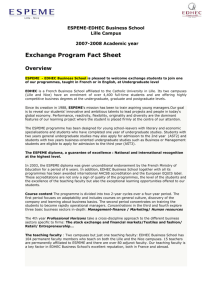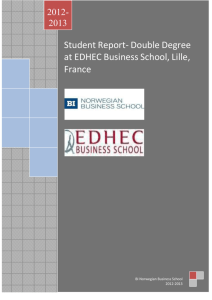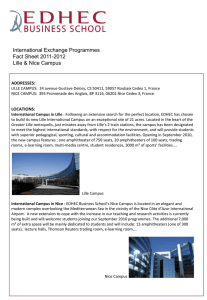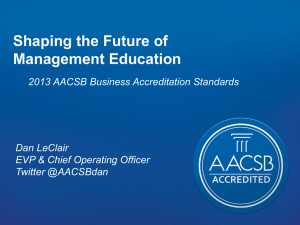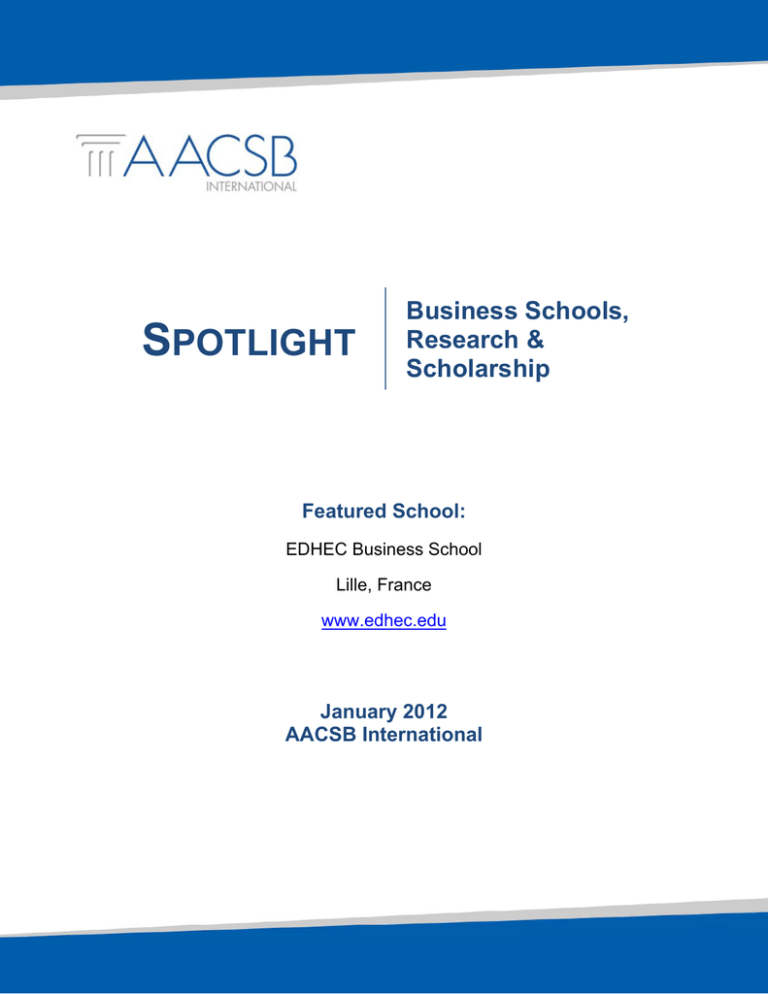
SPOTLIGHT
Business Schools,
Research &
Scholarship
Featured School:
EDHEC Business School
Lille, France
www.edhec.edu
January 2012
AACSB International
SPOTLIGHT | Business Schools & Research/Scholarship
EDHEC Business School | 2
Research for Business at EDHEC Business School
In 2004, EDHEC Business School implemented a “Research for Business Strategy.” The strategy
supports EDHEC’s philosophy that a business school does not become a leader in research by the
quantity of articles it publishes, but rather by producing research that serves businesses and students and
that displays “strategic coherence.”1 In fact, prior to taking on any new research initiative, EDHEC
evaluates whether the proposed initiative would contribute to the success of the research team at EDHEC
by addressing the following four criteria:
Supports academic credibility of EDHEC and impact on the market, i.e., business and,
more generally, the economy
Develops close ties with business
Increases the level of EDHEC’s resources either directly (financial support for the
research) or by the educational offerings that it supports and justifies
Promotes internationalization of the activities2
Professors select their research topics and make a proposal in which they address all the criteria, which is
followed by a selection of the projects. The research efforts at EDHEC are carried out in five research
centers, with ongoing work for future developments. The oldest and most established, the EDHEC-Risk
Institute, served as the initial model for the implementation of the Research for Business Strategy.
Five Founding Principles of the Research for Business Strategy
The research policy at EDHEC centers on the ability for research outcomes to impact enterprises and
society, and as a consequence to influence business practice. Prior to the implementation of the research
strategy this concept was, and arguably still is, new to most business schools in France, where the norm
has traditionally centered on academics performing research on an individual basis rather than through a
collective team or research center. Associate Dean for Faculty and Research, Dr. Stéphane Gregoir, and
EDHEC Development Director and EDHEC Risk Institute Director, Dr. Noel Amenc, emphasize that a
research center model in which the business school must compete on the number of papers it publishes
would not have been sustainable nor add value to EDHEC, and therefore the Research for Business
Strategy called for a different vision. According to Dr. Amenc, at EDHEC creating value means “using
academic research and rigor to solve problems” of the stakeholders (students, corporate sponsors, and
the environment)–a practice that is predominantly seen in art and technology sciences and is less popular
among the social sciences.
© AACSB International. All Rights Reserved.
SPOTLIGHT | Business Schools & Research/Scholarship
EDHEC Business School | 3
The Research for Business Strategy in effect today is based on the following Five Principles:
1. Organization of group research founded on ambitious and realistic objectives
2. Increasing and gauging the impact of its research on business and, more broadly, on the economy
3. Earning credibility for its original research strategy by producing recognized academic work in each
of its chosen themes
4. Viewing research as an integral part of a program for producing and spreading knowledge
5. Putting in place an ambitious policy of communicating research results to achieve the objectives
of making an impact and spreading knowledge3
According to Dr. Amenc, the Five Principles are “really the keystone of the strategy and the elements that
are used in the assessment of success—where we stand and where we want to go.” Thus, the Research
Director works collectively with the director of each research center, on an ongoing basis, to align
research activities with the Five Principles and the school’s strategic plan. Assessments of research
policy are conducted annually with the dean to monitor accomplishments and plan for goals to be
achieved in the following three years, as well as to align budgeting, resource allocation, etc., with the
strategic plan.
Mobilizing Faculty
Measures of success are completely objective, adds Gregoir; EDHEC monitors citations of research
published in papers and in articles in highly regarded academic journals, as well as in top global business
media sources used by professionals. Dr. Amenc estimates that in 2011, EDHEC had 336 quotations in
the press, 60% being international and 40% being national press, and 20% in journals and magazines.
Furthermore, several direct channels, including questionnaires and opportunities for active engagement
by industry professionals (as discussed further below), enable the school to collect feedback from
professionals concerning their views on the research and publications.
The objective criteria help faculty adhere to EDHEC’s research strategy. As Dr. Gregoir explains, “a
professor will not accept the change in strategy if he or she cannot rely on objective criteria. [He or she]
will not be mobilized if criteria are thought to be too subjective.” Furthermore, faculty members are
presented with a set of incentives to take part in various research projects. An EDHEC professor’s work
load consists of both teaching and research activities, in which part of the research activity is based on
performance in both areas (research and teaching). Professors can be members of a research center
through which they receive financial incentives to develop applied and/or academic research, to
participate in projects with firms, and/or to serve as a scientific director. The success of these various
activities corresponds to bonuses in a professor’s salary.
© AACSB International. All Rights Reserved.
SPOTLIGHT | Business Schools & Research/Scholarship
EDHEC Business School | 4
Because of EDHEC’s focus on academic research with relevance and value to industry, a portion of the
research funding comes from corporations and is used in compensating the faculty bonuses. Dr. Amenc
says that roughly 10 million EUR per year are collected from industry to support the research strategy and
activities, which is significant in France where endowments are not common practice. The large interest
among industry to fund research lies in the belief that it brings value to their business practices and brand
name recognition. However, the school takes care to ensure that the research remains purely academic
and does not serve as a business consulting initiative.
Dialogue between Business and Academia
EDHEC undertakes an “ambitious communication policy” in order to promote effective dialogue with the
business community on which it relies for involvement in identifying potential research topics. Two
avenues enable EDHEC to identify and evaluate research topics of interest to industry:
1. Involving professionals who work in industry in the administration activities at EDHEC, fostering
dialogue between them and academics in the process.
2. Listening to questions raised by professionals attending conferences organized by the research
centers, and evaluating possibilities for related further study.
With over 23,000 business leaders representing countries all around the world attending annually,
EDHEC’s research conferences are vital to promoting communication and knowledge transfer between
the research centers and industry. Each research center is expected to organize at least one conference
per year. Conferences are either specialized in nature where professionals are invited to listen and
contribute to dialogue on a single position paper, or are larger, global conferences lasting 2-3 days that
may be multi-disciplinary in nature. For instance, joint ventures between EDHEC Risk Institute and the
Economics Research Center on the topic of real estate and sovereign wealth management, or with the
Financial Analysis and Accounting Research Center on the topic of Solvency II, aim to present joint
research findings at upcoming conferences.
At an annual advisory board meeting, industry members come together with the director of each research
center to assess the relevance of papers recently produced, as well as to provide feedback on the design
of new three-year research initiatives. They also guide the creation of effective channels for promoting
research, often providing direct contact with relevant industry stakeholders.
Additionally, EDHEC maintains a database of more than one million global professional contacts to which
it disseminates research findings in a monthly newsletter. The Risk Institute, for example, has created a
website devoted to scientific research on risk management and asset allocation with the aim of bringing
© AACSB International. All Rights Reserved.
SPOTLIGHT | Business Schools & Research/Scholarship
EDHEC Business School | 5
the academic and business worlds closer together.4 Furthermore, the work of the research center has
also resulted in the creation of EDHEC Asset Management Education designed to help investment
professionals upgrade their skills with advanced risk and asset management training across traditional
and alternative classes.
As communicated in the Five Principals, EDHEC research is to be used to enrich “existing programs and
[create] innovative programs in undergraduate, graduate, and executive education.” Additionally, the
research should be “challenging and intellectually stimulating” to indirectly reinforce academic quality and
attainment in the programs to which it contributes.5 Therefore, the research produced at EDHEC not only
is used in creating executive seminars, but feeds into the curriculum of longer-term programs such as the
MSc in Risk and Investment program, which is directly based on research from the research center, as
well as the MBA program. Many PhD students are also involved with research activities through the
numerous research assistant positions.
As research increasingly becomes a more important activity at business schools worldwide, EDHEC’s
strategy allows the school to keep research at the forefront of the majority of its activities, without
compromising its objectives to serve and bring real value to the business community. Research is
regarded as a strategic investment at EDHEC and has not only helped boost the School’s reputation as a
highly respected business school, but also remains at the very core of the development of all its offerings.
Acknowledgements: AACSB International is grateful for the assistance of Dr. Stéphane Gregoir,
Associate Dean for Faculty and Research, and Dr. Noel Amenc, EDHEC Development Director and
EDHEC Risk Institute Director.
© AACSB International. All Rights Reserved.
SPOTLIGHT | Business Schools & Research/Scholarship
EDHEC Business School | 6
End Notes 1
EDHEC Business School (2012). Our Strategy: Research for Business webpage. Electronic document, http://faculty‐research.edhec.com/jsp/fiche_pagelibre.jsp?CODE=78756425&LANGUE=1, accessed December 19, 2011. 2
EDHEC Business School (2012). Our Strategy: Research for Business webpage. Electronic document, http://faculty‐research.edhec.com/jsp/fiche_pagelibre.jsp?CODE=78756425&LANGUE=1, accessed December 19, 2011. 3
AACSB International. EDHEC Executive Summary Academic Years 2003‐2008. 4
EDHEC Business School (2012). EDHEC Risk Institute webpage. Electronic document, http://faculty‐
research.edhec.com/jsp/fiche_pagelibre.jsp?CODE=42913860&LANGUE=1&RH=researchcentres, accessed January 4, 2012. 5
AACSB International. EDHEC Executive Summary Academic Years 2003‐2008. © AACSB International. All Rights Reserved.

